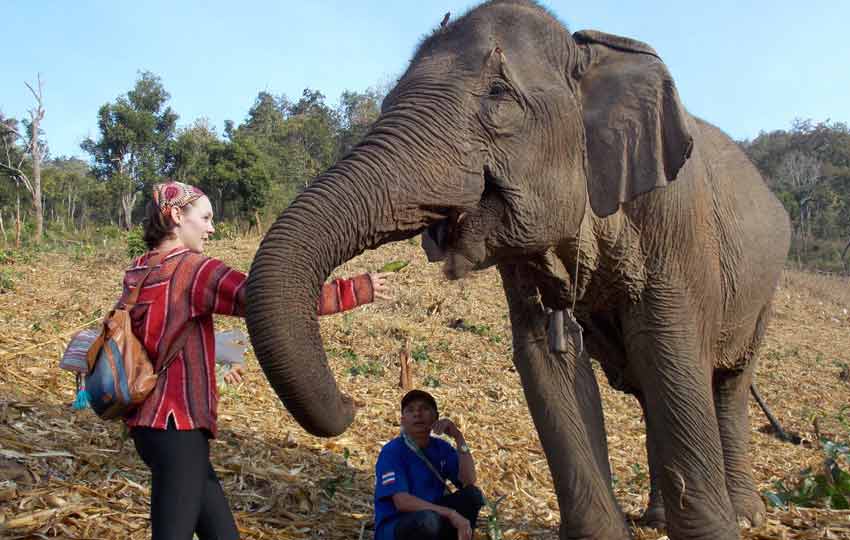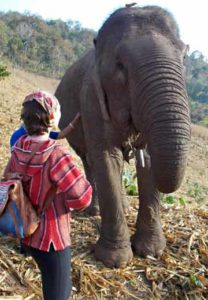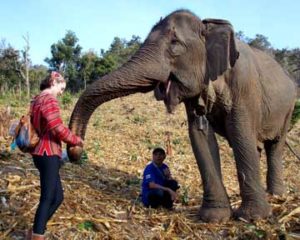Rehabilitating Asian Elephants: A Pre-Vet Student’s Jan Term Journey

Amberleigh Dryman ’16’s affinity for animals began at a young age. But her passion for their well-being and ethical treatment came when she was a teenager, during a trip to North Africa. “I was in Morocco riding in a carriage pulled by a horse, “ Amberleigh said. “The horse was obviously ill and not receiving the proper care. She collapsed while I was in the carriage. She had gone through years of abuse and was nothing more than a tourist attraction. I decided right then that veterinary medicine was my path.”
“Everything with Converse felt so personalized and I did not feel like another number on a list. I chose Converse because no other school made me feel like this.”
Amberleigh plans to spend her life working with large and exotic animals and a BS in Biology with a Pre-Veterinary track was the first step to accomplishing that dream. When she began applying to colleges her mom encouraged her to take a tour at Converse, though Amberleigh had her heart set on moving to Charleston. But a few hours on our campus and the personalized welcome from our counselors changed Amberleigh’s mind. “I felt so welcomed, important, and at home as soon as I stepped foot onto this campus,” Amberleigh said. “Everything with Converse felt so personalized and I did not feel like another number on a list. I chose Converse because no other school made me feel like this.” As senior year approached, Amberleigh was encouraged by Dr. Edna Steele, A
ssociate Professor of Biology and Pre-Vet Advisor, to pursue an internship, bolstering Amberleigh’s applications to vet school. She began searching for an internship that would allow her to combine her two loves – animals and travel. A conservation and rehabilitation program for elephants in Thailand, through Global Visions International, was the perfect fit. The program’s purpose is to reintroduce Asian elephants currently living in captivity back into the wild. Amberleigh spent her days following the elephants from a distance and collecting data about their behavior. “A big part of the rehabilitation and reintroduction project is discouraging the use of elephants in the tourist industry,” Amberleigh said. “Most of these tourist camps do shows with elephants and ride them, but this is actually not healthy for the elephants. It harms them mentally and physically. Riding an elephant with a saddle can cause permanent spinal damage to the elephant and an elephant stuck in captivity often develops neurological problems.”
Read more about Amberleigh’s elephant adventure in Thailand:
“My experience in Thailand was life changing. I arrived in Chiang Mai, Thailand a week early in order to explore the city, but the project itself was not in Chiang Mai. The project was in a small village called Huay Pakoot, which is a 5-hour drive outside of Chiang Mai. The village is in the rural mountain region of Northern Thailand. I lived with a homestay and they did not speak English, but that did not stop us from developing a close friendship.
The village language is Pakinyaw, not Thai. I had to adapt to ice-cold bucket showers and squat potties during my time here, but this challenge did not take away from the joyous time I had on this project. “During my time in Huay Pakoot I took Pakinyaw lessons, attended lectures on elephant behavior and health, and biodiversity lectures.
There were multiple projects going on in this village so I participated in many things. Every morning during my time in Huay Pakoot we would meet with other team members and hike for 6-7 hours a day. We would follow one of our two elephant herds during those hours. One herd of elephants consisted of four adult elephants and the other was a family of elephants (grandmother, mother, and grandson). Each intern would be assigned an elephant and record their behavior. The reason we recorded the behavior of the elephants is simply because most knowledge about elephant behavior is on African elephants, not Asian elephants.
“I was constantly exhausted but I wouldn’t trade this time of my life for anything else. It was unforgettable.”
“Multiple times a week we would also complete health checks on the elephants. We would examine their skin, toe nails, mouth, and eyes then record what we found in our health check forms. In order to complete the health checks one person would constantly feed the elephant bananas as a distraction while two other people quickly did the health check. I was also able to visit an elephant hospital towards the end of my time in Thailand, which was a great experience. There are many people in Thailand working towards improving the life of the Asian elephants in their area. Change is coming.
“In addition to working with the elephants I would participate in biodiversity projects. These projects also consisted of hikes that lasted multiple hours. We would record the bird species we saw and capture insects for data purposes as well. The purpose of this project was to build a species list of the Huay Pakoot area in order to spread the conservation project to other species in the area. Overall, I was constantly exhausted but I wouldn’t trade this time of my life for anything else. It was unforgettable.”
Amberleigh will graduate from Converse this May and has received numerous acceptances from graduate schools abroad. She has accepted an offer from the Royal Veterinary College in London.
Converse offers a variety of study travel options. Our Director of Study Travel would be thrilled to work with you to create your own study-travel experience to fit your academic needs and personal preferences.

